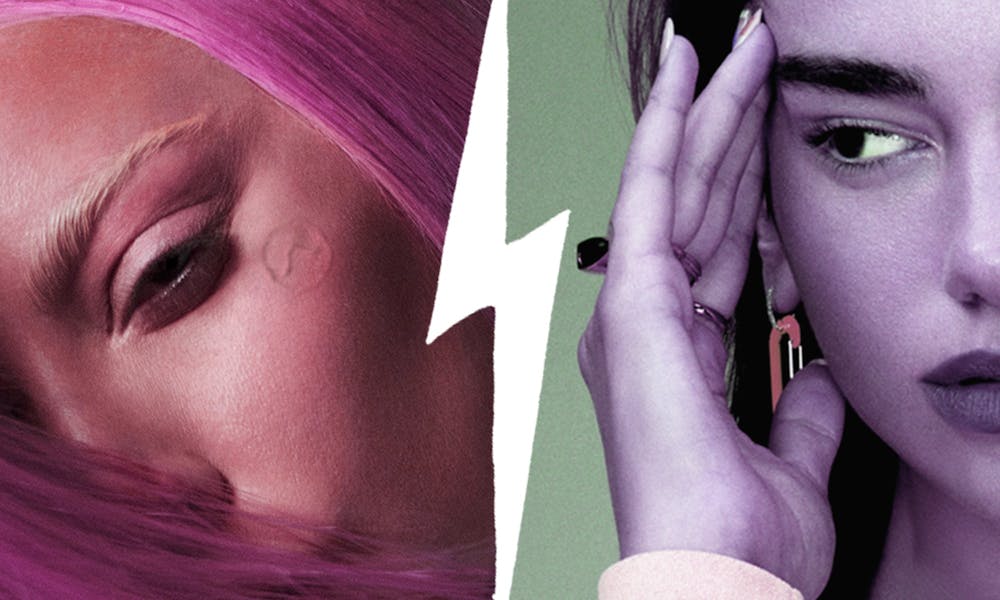To occupy myself in this endless quarantine, I've taken to going on walks around my neighborhood. I always bring headphones with me, so I can bury myself deep into the sonic worlds of whatever albums I'm listening to. However, when British pop star Dua Lipa dropped Club Future Nostalgia, I avoided listening to it on my daily walks. Instead, I waited until it was late at night and everyone else in my house was asleep. Then, I lay on my couch in the dark in an attempt to recreate the atmosphere of a club: the space where the music was meant to be heard.
This is the predicament of releasing club music in a pandemic, the elephant in the room, which Club Future Nostalgia doesn't even nod at. In this time of self–isolation and social distance, it's hard to find space (although there's plenty) to be physical, to dance with others.
Club Future Nostalgia, mixed and curated by DJ the Blessed Madonna, is the remix of Dua Lipa's sophomore effort Future Nostalgia. The remixed album, featuring a diverse cast of characters and sounds, with everyone from Gwen Stefani and Mark Ronson to Missy Elliott, BLACKPINK, and Madonna, would not sound out of place blasting from the speakers of a crowded club at 2 AM, but it falls limp coming from laptop speakers or dingy headphones when you're home alone in self–quarantine. Sure, the voices and beats can command a makeshift living room dance floor, but they fail to produce any atmosphere—there's no gyrating bodies or strobe lights. Instead, the Blessed Madonna's well paced DJ mix becomes a party for one.
Even though the music lacks its proper context, it's still irresistibly fun. It makes you move despite the current circumstances of the world. Highlights such as Zach Witness' and Gen Hoshino's sassy and seductive remix of "Good in Bed," rife with double entendres, bursts onto the scene in the record's first half, which is front—loaded with bops. "Boys Will Be Boys" becomes a militaristic feminist anthem, complete with a chanting crowd of a chorus and battering drums in Zach Witness' hands. Jayda G's rework of "Cool" sounds destined for early morning dance floors once clubs open back up. Meanwhile, The Blessed Madonna's "Levitating" remix, though bloated with an inclusion of both Madonna and Elliot, is still fun, albeit tacky.
That being said, Moodymann's "Break My Heart" remix is meditatively groovy, even if it extends the album just a minute or two past its welcome length, capturing the essence of that moment when the lights turn on and it's time to stumble home. Yaeji's "Don't Start Now" is strangely lopsided, as she warps the phrase "don't start caring about me" with tedious repetition.
If there is one complaint with Dua Lipa as pop star, it's that she’s at best commercial, competent, and cool, lacking a defining personality beyond her signature blonde hair and steely self assurance. On Club Future Nostalgia, The Blessed Madonna and her other collaborators add some of the personality lacking from Dua Lipa lacks, but in doing so, they rehash sure–fire hits from decades ago. Take the sample of Gwen Stefani’s inescapable “Hollaback Girl” from 2004 embedded in Mr Fingers' deep strip mix of "Hallucinate," or Neneh Cherry's "Buffalo Stance" which closes out Zach Witness' and Gen Hoshino's remix of "Good in Bed." Dua blends into the background, a stone giant among many.
Released the same Friday as Club Future Nostalgia, Honey Dijon's remix of Lady Gaga's "Free Woman" lives up to the description of club music for the apocalypse. Unlike either version of Future Nostalgia, Gaga's Chromatica nods to the current pandemic through her futuristic, almost transhuman visual aesthetic. Even the "plot" behind the record—different factions competing for control on the wasteland of an alien planet—could be seen as a reference to the civil unrest and protests for #BLM happening in American cities.
Club Future Nostalgia has none of these au courante references, save a name change. The Blessed Madonna, who is white, used to go by the Black Madonna, until she changed it in the wake of protests in the name of George Floyd. Even with the new name, she still faced unnecessary and unwarranted backlash from Twitter stans who were more displeased with her handling of Club Future Nostalgia than the confounding racism in her former stage name. With this in mind, it feels like the album and the people behind it forgot to read the room. It's too loud in a time that demands quiet introspection, creating a cognitive dissonance between the world outside and the one Dua Lipa, alongside her collaborators, wants fans to live in.
Club Future Nostalgia, had it been released at any other time, wouldn't have to answer for the pandemic. But because it was made in quarantine, it's strange that there's nothing to tie the record down to at least one of the many historical events of 2020. The club exists apolitically, without any of the concerns plaguing its audience. It has always been a place for escape, after all. About halfway into the record, Dua Lipa says, as if on a PA, "You're locked into Club Future Nostalgia." Unfortunately for Lipa, we're not. The aux is right there, and we can leave the club at any time.







